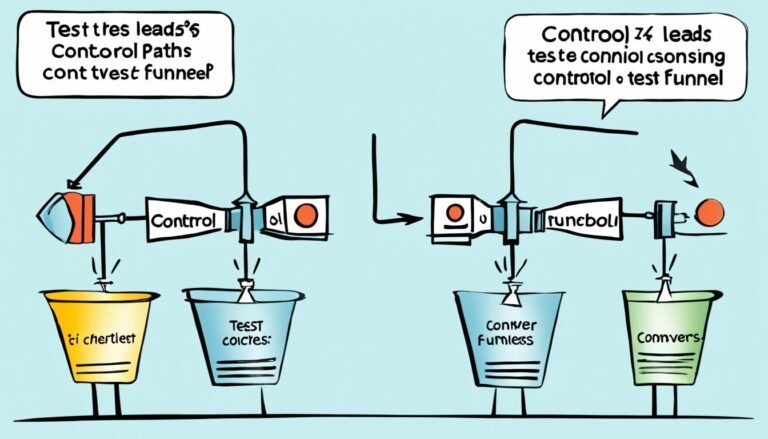Unlock Sales Potential with Behavioral Profiling
Understanding customer psychology and behavior is essential for successful sales. By leveraging behavioral profiling, businesses can gain valuable insights into customer decision-making processes and tailor their sales strategies accordingly. In this article, we will explore the importance of behavioral profiling for sales success and uncover how it can optimize sales techniques and strategies.
Key Takeaways:
- Behavioral profiling allows businesses to understand customer decision-making processes.
- By leveraging behavioral insights, sales techniques and strategies can be optimized.
- Understanding customer psychology is crucial for tailoring sales approaches.
- Behavioral profiling improves sales effectiveness and conversion rates.
- Unlocking sales potential requires a deep understanding of customer behavior.
The Importance of Customer Behavior Analysis
Understanding how customers think, make decisions, and act is crucial for sales success. Behavioral analysis provides valuable insights into customer personas, their journey maps, and decision-making processes. This information enables businesses to tailor their sales strategies and techniques to effectively engage and convert potential buyers.
By conducting behavior analysis and personality assessments, businesses gain a deeper understanding of buyer behavior and preferences. This allows them to segment their target audience and create personalized marketing approaches that resonate with individual customers.
Behavioral analysis also uncovers valuable insights into the decision-making processes of customers. Through methods such as customer surveys, interviews, and data analysis, businesses can identify patterns and trends in buyer behavior. This knowledge enables them to optimize their sales funnels and customer journeys, removing any barriers that may hinder conversions.
One effective method of behavior analysis is the use of personality assessments. These assessments help identify customers’ motivations, needs, and pain points. Armed with this understanding, sales teams can tailor their approach based on individual personality types and effectively address customers’ specific concerns.
Customer behavior analysis helps businesses gain a competitive edge by providing actionable insights into buyer behavior. By utilizing these insights, companies can create targeted sales strategies and techniques to enhance their sales performance and drive business growth.
The Benefits of Customer Behavior Analysis:
- Developing effective marketing strategies based on customer preferences and behaviors
- Improving customer engagement and satisfaction through personalized experiences
- Increasing conversion rates by optimizing sales processes and removing barriers to purchase
- Identifying and addressing customer pain points and objections
- Enhancing sales team effectiveness by tailoring approaches to individual personality types
By harnessing the power of customer behavior analysis, businesses can gain a comprehensive understanding of their target audience, which in turn enables them to create highly effective sales strategies that drive results.
Improving Sales Performance through Training
Sales training is a crucial component in driving sales effectiveness and achieving business success. By incorporating behavioral profiling into sales training programs, sales teams can enhance their understanding of customer psychology and behavior, leading to improved sales performance and increased conversion rates.
Behavioral profiling involves studying and analyzing buyer behavior to gain insights into their decision-making processes and preferences. This understanding allows salespeople to adapt their approach and communication style to effectively build trust and rapport with potential clients. By tailoring their sales techniques to align with customer psychology, sales teams can create personalized and compelling sales experiences that resonate with buyers.
“Sales training programs that incorporate behavioral profiling provide sales teams with the tools and knowledge to understand and connect with customers on a deeper level. This allows them to deliver more impactful sales presentations and effectively address buyer concerns, resulting in greater sales effectiveness and improved conversion rates.”
Moreover, sales training that incorporates sales psychology equips salespeople with the skills to navigate buyer objections and overcome common sales challenges. By understanding the psychology behind buyer behavior, sales teams can anticipate objections and proactively address them, increasing their chances of closing deals successfully.
A well-designed sales training program also focuses on enhancing sales techniques and communication skills. Through role-playing exercises, interactive workshops, and real-life scenarios, sales teams can fine-tune their approach, sharpen their negotiation skills, and learn effective persuasion techniques. This prepares them to engage with buyers confidently and persuasively, ultimately driving sales effectiveness.
By investing in sales training that integrates behavioral profiling and sales psychology, businesses can empower their sales teams to maximize their potential. With the right training, salespeople can adapt their approach, build meaningful connections with buyers, and increase their sales effectiveness. This ultimately leads to higher conversion rates, increased revenue, and long-term business growth.
Maximizing Sales Potential with Sales Strategies
Implementing targeted sales strategies based on behavioral profiling can help maximize sales potential. By understanding customer motivations, preferences, and pain points, sales teams can tailor their approach to effectively address buyer needs and increase sales performance.
When crafting sales strategies, it is important to consider the insights gained from behavioral profiling. This technique allows sales teams to delve deeper into customer behavior, enabling them to identify the triggers and motivations that drive purchasing decisions.
By understanding customer preferences, sales teams can develop sales techniques that resonate with potential buyers. Whether it’s highlighting the key benefits of a product or service, showcasing how it addresses specific pain points, or aligning the offering with their values, sales strategies can be customized to address the unique needs of different customer segments.
Additionally, sales teams can use behavioral profiling to personalize their communication and engagement with customers. By understanding their preferred communication channels, language styles, and decision-making processes, salespeople can adapt their approach to build rapport and trust, ultimately increasing the chances of closing a sale.
“Understanding the customer’s behavior is key to effective sales strategies. By tailoring our approach to their preferences and motivations, we can increase our sales performance while providing a personalized experience that resonates with our customers.” – Sarah Thompson, Sales Manager, XYZ Corporation.
Moreover, behavioral profiling can also inform the development of targeted marketing campaigns and promotions. By understanding customer preferences and pain points, businesses can create compelling messaging and offers that are more likely to capture the attention and interest of potential buyers.
The Benefits of Sales Strategies Based on Behavioral Profiling:
- Increased sales performance and conversion rates.
- Improved customer engagement and satisfaction.
- Personalized and tailored approaches that resonate with customers.
- Enhanced rapport and trust building with potential buyers.
- More effective targeting of marketing campaigns and promotions.
By leveraging the insights gained from behavioral profiling, businesses can optimize their sales strategies and techniques, ultimately maximizing their sales potential. When coupled with effective sales training and a customer-centric approach, sales teams can achieve impressive results and drive consistent business growth.
The DNA of High-Performing Salespeople
High-performing salespeople possess a unique combination of traits and behaviors that contribute to their success. Understanding these characteristics can provide valuable insights into improving sales performance, leveraging sales psychology, and implementing effective sales techniques. Here are some key attributes that define high-performing salespeople:
Resilience
Resilience is a crucial quality that enables salespeople to bounce back from rejections and setbacks. It allows them to maintain a positive mindset, persevere during challenging times, and keep pushing towards their sales goals.
Problem-Solving Skills
High-performing salespeople excel at problem-solving. They can quickly identify customer pain points, offer tailored solutions, and address objections effectively. Their ability to think critically and provide innovative solutions sets them apart from the competition.
Building Rapport with Customers
Establishing rapport is essential for successful sales interactions. High-performing salespeople have a natural talent for building genuine connections with customers. They possess excellent interpersonal skills, actively listen to customer needs, and create relationships based on trust and mutual understanding.
Quote: “Successful selling is not about convincing or manipulating; it’s about building relationships and providing value.” – Zig Ziglar
Identifying these traits and behaviors is crucial when building a high-performing sales team. Incorporating them into sales training programs can help develop the necessary skills and mindset to drive sales performance. Additionally, integrating these characteristics into the hiring process ensures that sales teams are comprised of individuals who possess the potential for success.
By recognizing the DNA of high-performing salespeople and leveraging their strengths, businesses can enhance their sales performance, apply effective sales techniques based on sales psychology, and achieve sustainable growth.
The Role of Sales Process and Methodology
A well-defined sales process and methodology provide structure and consistency to sales activities. By following a standardized approach, sales teams can effectively engage with customers, qualify leads, and close deals. The alignment of the sales process with behavioral profiling insights plays a significant role in enhancing sales effectiveness.
When it comes to the sales process, having a clear and well-defined set of steps ensures that each interaction with a potential customer is optimized. This involves identifying and understanding the various stages of the sales cycle, from initial contact to post-sale follow-up.
By properly documenting and implementing an effective sales methodology, organizations can streamline their sales efforts and improve overall sales performance. A sales methodology defines the specific strategies, tactics, and tools used throughout the sales process to maximize sales effectiveness. It provides a framework for sales teams to consistently apply best practices and achieve measurable results.
The Benefits of a Well-Defined Sales Process
A well-defined sales process offers a range of benefits for both sales teams and businesses:
- Consistency: By following a standardized process, sales teams ensure consistency in their approach, enhancing the customer experience and building trust.
- Efficiency: A defined sales process improves efficiency by providing a roadmap for sales representatives to follow, reducing guesswork and wasted time.
- Accountability: With a clear sales process in place, it becomes easier to track and measure sales performance, enabling better accountability and performance management.
- Scalability: A well-defined sales process can be replicated and scaled as the business grows, ensuring consistent results across different sales teams and markets.
Aligning the sales process with behavioral profiling insights takes sales effectiveness to the next level. By understanding customer behavior and motivations, sales teams can tailor their approach, messaging, and value proposition to resonate with potential buyers. This personalized approach greatly increases the chances of conversions and ultimately drives business growth.
Implementing a well-defined sales process and methodology, coupled with behavioral profiling insights, empowers sales teams to consistently deliver results and optimize their sales efforts. By understanding customers on a deeper level and adapting the sales process accordingly, businesses can enhance their sales effectiveness and achieve better outcomes.
Building a Strong Sales Team
Hiring, onboarding, and training the right sales talent is crucial for building a strong sales team. By defining sales roles, establishing a structured hiring process, and implementing comprehensive training programs, businesses can ensure they have the right people with the right skills to drive sales success.
Defining Sales Roles
Before embarking on the hiring process, it is essential to define clear sales roles within the organization. This involves identifying the specific responsibilities, targets, and expectations for each role. By clearly defining sales roles, businesses can ensure that the right individuals are recruited and that there is clarity and alignment within the sales team.
Establishing a Structured Hiring Process
A structured hiring process is essential for identifying and attracting top sales talent. This involves creating a detailed job description that outlines the desired skills, experience, and qualifications. By leveraging technology, such as applicant tracking systems and behavioral assessments, businesses can streamline the hiring process, assess candidates objectively, and make data-driven decisions.
Implementing Comprehensive Training Programs
Training is a critical aspect of building a strong sales team. Implementing comprehensive training programs ensures that salespeople have the necessary knowledge, skills, and tools to excel in their roles. These programs can include product knowledge training, sales techniques, negotiation skills, and customer relationship management. By investing in ongoing training and development, businesses can empower their sales team to consistently achieve sales targets and drive business growth.
| Sales Role | Responsibilities | Skills Required |
|---|---|---|
| Sales Representative | Prospecting and lead generation, maintaining client relationships, conducting sales presentations | Strong communication skills, ability to build rapport, negotiation skills |
| Sales Manager | Setting sales targets, coaching and mentoring the sales team, analyzing sales data | Leadership skills, strategic thinking, data analysis |
| Key Account Manager | Managing key client accounts, identifying upselling opportunities, resolving customer issues | Relationship management, problem-solving skills, customer service orientation |
Building a strong sales team requires a strategic approach to talent acquisition, onboarding, and development. By focusing on defining sales roles, implementing a structured hiring process, and providing comprehensive training, businesses can assemble a high-performing sales team equipped to drive sales success.

Performance Measurement and Accountability
In order to effectively track sales performance and ensure accountability, businesses must establish key performance indicators (KPIs) and implement performance measurement systems. By analyzing sales metrics, businesses can gain valuable insights into their sales effectiveness and identify areas for improvement.
Tracking sales metrics is crucial for understanding the impact of sales strategies and techniques on overall performance. It provides tangible data that allows businesses to evaluate the success of their sales efforts and make informed decisions to drive growth.
“Sales metrics are essential for monitoring performance and identifying areas for improvement. They provide a clear picture of sales effectiveness and allow businesses to hold their sales teams accountable.”
Key performance indicators can vary depending on the goals and objectives of a business. Common sales metrics include:
- Revenue generated
- Number of new customers acquired
- Conversion rates
- Average deal size
- Sales cycle length
By consistently tracking these metrics, businesses can measure their sales performance against set targets and benchmarks. This enables them to identify areas of strength and areas that require improvement, allowing for a proactive approach to sales strategy and execution.
The Role of Performance Measurement
Performance measurement goes beyond simply tracking sales metrics. It involves analyzing the data collected and using it to drive meaningful insights and actionable strategies that lead to improved sales performance.
“Effective performance measurement provides the foundation for continuous improvement and drives sales teams towards success.”
Through performance measurement, businesses can identify trends, patterns, and correlations in the sales data. This helps them understand the factors that contribute to sales success and those that hinder performance.
Furthermore, performance measurement allows businesses to identify top-performing salespeople and learn from their strategies and techniques. It provides benchmarks for performance expectations and helps identify areas where additional training and support may be required.
| Sales Metric | Definition |
|---|---|
| Revenue generated | The total sales revenue generated within a specific period |
| Number of new customers acquired | The number of new customers or clients gained within a specific period |
| Conversion rates | The percentage of leads or prospects that turn into paying customers |
| Average deal size | The average value of each closed deal |
| Sales cycle length | The average duration it takes to close a deal, from initial contact to final sale |
By leveraging performance measurement and sales metrics, businesses can establish transparent accountability within their sales teams. The availability of data allows for effective performance evaluations, targeted coaching, and goal setting to continuously improve sales performance and achieve business objectives.
Conclusion
Behavioral profiling is a powerful tool that can unlock sales potential and drive sales success. By gaining deep insights into customer behavior, sales teams can tailor their approach and strategies to effectively engage potential buyers. Understanding the motivations, preferences, and pain points of customers allows sales professionals to personalize their interactions, increase conversion rates, and ultimately boost business growth.
With the right training, tools, and strategies in place, businesses can harness the power of behavioral profiling to achieve remarkable sales results. By incorporating behavioral profiling into sales training programs, salespeople can adapt their communication style and build strong relationships based on trust and rapport. This enables them to effectively address buyer needs and close deals more successfully.
Moreover, aligning the sales process with behavioral profiling insights can enhance sales effectiveness. A well-defined sales process that takes into account customer behavior and decision-making patterns ensures consistency and streamlines sales activities. This leads to improved sales performance, as sales teams are better equipped to engage with customers, qualify leads, and maximize sales potential.
In conclusion, by embracing behavioral profiling as a key component of sales strategies, businesses can unlock their sales potential and pave the way for long-term sales success. Understanding customer behavior and tailoring the sales approach accordingly can lead to increased conversion rates, higher customer satisfaction, and ultimately, business growth.







